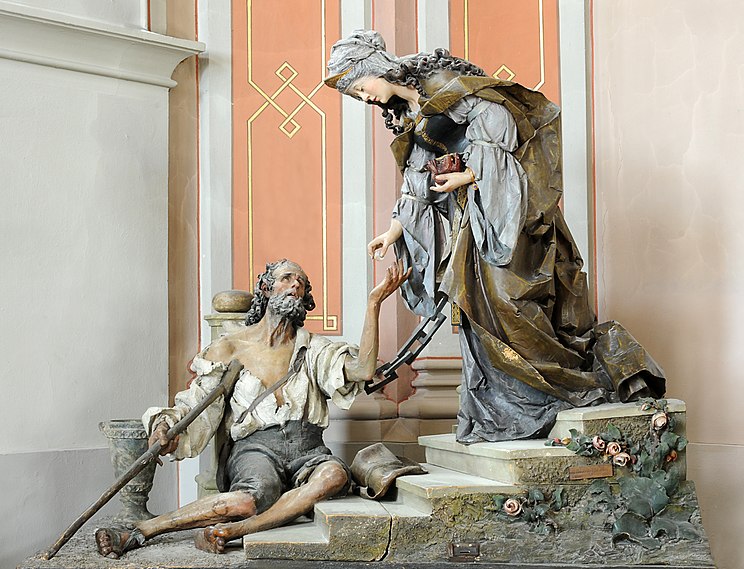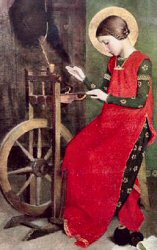St Elizabeth of Hungary (1207-1231), the patron saint of Franciscan Tertiaries (Secular Franciscans and members of the many religious congregations of the Franciscan Third Order). She was a princess, married at 14, mother of three, widowed at 20 and forced, with her children, out of their home in winter, finding herself living in a disused pigsty shown ot her by a kind shepherd.
St Elizabeth had an extraordinary love for the sick and the poor and built a hospital in Marburg, Germany, where she daily worked. She died at the age of 24 and was canonized four years later.
This remarkable woman, along with being patron of Third Order Franciscans, is also a patron of many other groups: Bakers; beggars; brides; Catholic charities; charitable societies; charitable workers; charities; countesses; death of children; exiles; falsely accused people; hoboes; homeless people; hospitals; in-law problems; lacemakers; lace workers; nursing homes; nursing services; people in exile; people ridiculed for their piety; Sisters of Mercy; Teutonic Knights; toothache; tramps; widows.
You can read more about her here.
From a letter by Conrad of Marburg, spiritual director of Saint Elizabeth of Hungary (used in the Office of Readings for the saint):
Elizabeth was a lifelong friend of the poor and gave herself entirely to relieving the hungry. She ordered that one of her castles should be converted into a hospital in which she gathered many of the weak and feeble. She generously gave alms to all who were in need, not only in that place but in all the territories of her husband’s empire. She spent all her own revenue from her husband’s four principalities, and finally she sold her luxurious possessions and rich clothes for the sake of the poor.
Twice a day, in the morning and in the evening, Elizabeth went to visit the sick. She personally cared for those who were particularly repulsive; to some she gave goods, to others clothing; some she carried on her own shoulders, and performed many other kindly services. Her husband, of happy memory, gladly approved of these charitable works. Finally, when her husband died, she sought the highest perfection; filled with tears, she implored me to let her beg for alms from door to door.
On Good Friday of that year, when the altars had been stripped, she laid her hands on the altar in a chapel in her own town, where she had established the Franciscan Friars Minor, and before witnesses she voluntarily renounced all worldly display and everything that our Savior in the gospel advises us to abandon. Even then she saw that she could still be distracted by the cares and worldly glory which had surrounded her while her husband was alive. Against my will she followed me to Marburg. Here in the town she built a hospice where she gathered together the weak and the feeble. There she attended the most wretched and contemptible at her own table.
Apart from those active good works, I declare before God that I have seldom seen a more contemplative woman.
Before her death I heard her confession. When I asked what should be done about her goods and possessions, she replied that anything which seemed to be hers belonged to the poor. She asked me to distribute everything except one worn-out dress in which she wished to be buried. When all this had been decided, she received the body of our Lord. Afterward, until vespers, she spoke often of the holiest things she had heard in sermons. Then, she devoutly commended to God all who were sitting near her, and as if falling into a gentle sleep, she died.


1 comment:
Wonderful post..thankyou Fr Sean..
Post a Comment